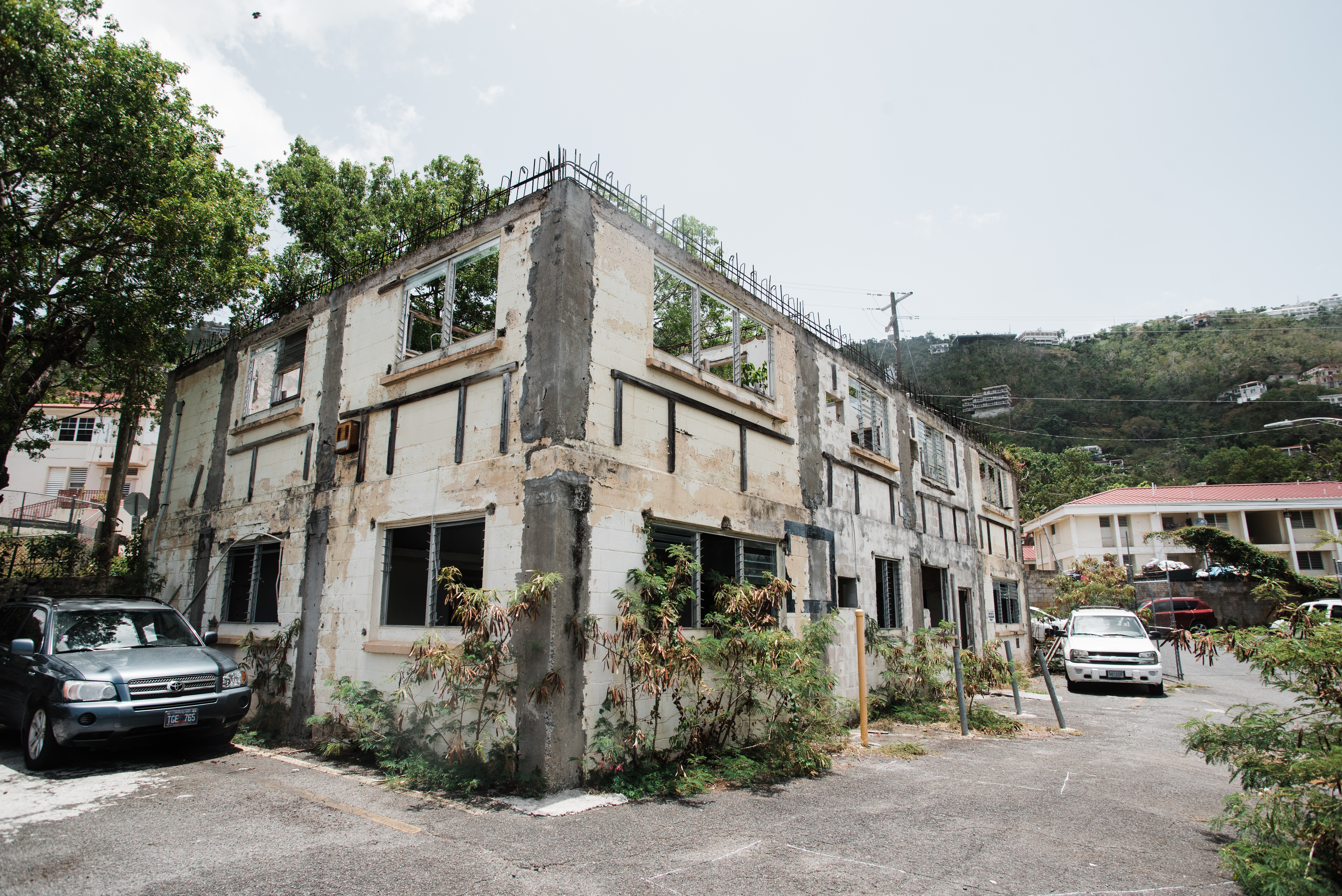Days after the second storm hit, her voice drifted out to the world.
The retired teacher, displaying signs of dementia, was alone in her home in September 2017. Around her: roofless buildings, leafless trees, a lifeless power grid and at least five deaths across the U.S. Virgin Islands.
As skies cleared, she called for her cat. That’s when a passerby heard her plea and found the teacher.
“That broke my heart,” says Pauline Dawes, a training coordinator with the U.S. Virgin Islands Department of Human Services (DHS). “She personified what (DHS) is all about, which is making sure that individuals in our community don’t fall into these holes.”
Hurricanes Irma and Maria, each packing winds exceeding 175 mph, roared through the Caribbean 14 days apart. The storms damaged about 90 percent of the buildings on St. Croix, St. John and St. Thomas – the three main bodies of the Virgin Islands, where one in four people already lived in poverty.

Power outages caused refrigerated food to spoil in homes and stores across the islands. For the next month, residents survived on military ready-to-eat meals (MREs) and canned goods. Tens of thousands of people, including the retired teacher, needed fresh foods and other nutritional provisions – a crucial job that fell to the DHS Division of Family Assistance.
That agency – part of the U.S. Virgin Islands government – works with the federal Disaster Supplemental Nutrition Assistance Program (D-SNAP), which gives food assistance to communities in need following natural calamities. But with no electricity and residents spread across dozens of islands, processing relief claims and doling out federal aid posed a massive logistical challenge.
“We needed to prove to (the federal government) that we had a system that could function,” Dawes says.
More than 2,000 miles away, employees at the Chicago software company RedMane – a Microsoft technology partner – monitored the crisis. RedMane already was working with government officials in the Virgin Islands to modernize the system that issues federal benefits (like Medicaid) to people in need.
“I had been traveling there every other week for two years at that point and made some good friends,” says Bob Borneman, RedMane business manager for the Virgin Islands DHS. “Much of our staff also spent significant time with the DHS people in design meetings over a year’s period and really got to know the DHS folks on a personal level.”
Once Virgin Islands residents regained cell phone service, Borneman and his team reconnected with those DHS officials, asking what they needed and what RedMane could do to support them after the storms.
The first big requests: battery-operated radios and battery-operated fans. The radios helped government employees communicate with citizens, instructing them where to go for daily food, and offering updates on the progress to restore electricity and other facilities.
“The fans were needed because, with no electricity, there was no AC. And also since it was so wet, there was a growing mosquito problem,” Borneman says. “We really felt helpless sitting in our office in Chicago and other places just watching the news and not being able to do anything.”

But the RedMane team soon devised a technological solution for DHS officials to securely provide emergency benefits: the cloud.
“We brought in Microsoft to help support that effort,” Borneman says.
Within three weeks – and by leveraging Microsoft Azure and Azure Government – RedMane had built a system on its mCase platform to process D-SNAP applications, sending the transactions to residents via Electronic Benefits Transfer (EBT) cards. Residents could subsequently use those cards at approved stores to buy food.
“There was no other easy way to get D-SNAP benefits to people in short order,” Borneman says.
RedMane also worked with Microsoft to supply the Virgin Islands government with a donation of $30,000 in cloud processing through Microsoft Services Disaster Response’s Azure Grants program. That initiative provides cloud resources to help communities in need.
“The grants allowed us to bring up a system without a lot of paperwork. It worked right out of the box within a few hours of asking the cloud to go up,” Borneman says. “Since the mCase D-SNAP solution was mobile and cloud based, it could work in remote locations. That allowed us to set up application points across all the islands of the territory.”
Using that system, Virgin Islands officials eventually provided more than $25 million in aid to nearly 60,000 people across the territory.
Microsoft’s hardware vendor partners also donated 60 tablets and laptops so that USVI workers could access the Azure-based D-SNAP applications. RedMane set up a lab to test, stage and pack the devices in ruggedized cases for shipment to the USVI.
“We were all excited,” Borneman says, “to find some way to help.”




